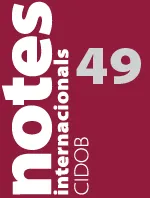Identity confrontations will not create new jobs in Tunisia

Notes internacionals CIDOB, núm. 49
A 1,85% decline in Gross Domestic Product and a big fall in tourist receipts is not a very large price to pay for the freedom to speak and vote after 23 years of increasingly corrupt rule by Ben Ali.
International financial aid for Tunisia was enough to help the country through a turbulent year which saw strikes and absenteeism in the public sector weaken the control of the state and a sharp fall in the production of phosphates, a major foreign income earner.
The Central Bank has played a key role in stabilising the country’s economy which was also negatively affected by the fighting in Libya.
Free elections and the advent of a En Nahda party dominated government have so far led to a rise in identity politics which do little to address the growing gap between an impoverished western and southern hinterland and a much richer and better educated coastal region.
Tunisia’s hard won status as a reliable exporter of high value added products in the mechanical and electronic sector is being eroded.
Unless it addresses these challenges head on, the new government led by Hamadi Jebali will quickly come to appreciate that identity confrontations divide Tunisia and will hasten the exit of foreign companies which to date has been limited to 170.
(...)